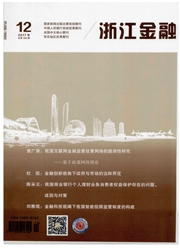

 中文摘要:
中文摘要:
由于农户小额贷款对象分散等特点,致使农户"融资难、融资贵"的问题相当严重。本文基于"互联网+农业金融"视角,对农户借贷行为影响因素进行研究。利用陕西省杨凌示范区、武功县220个农户调研数据,通过因子分析对农户使用互联网金融的意愿等10个指标进行线性变换降维,得到了农村互联网金融普惠发展程度等5个互不相关的公共因子;在此基础上,以5个公因子为自变量,以农户是否借贷为因变量,构建了二元Logistic回归模型。实证结果得出:农户家庭投入水平、农户家庭收入特征和农村互联网金融普惠发展程度对农户借贷行为有正向影响;农户家庭风险偏好对农户借贷行为有负向影响;农户交易成本对农户借贷行为的影响不显著。针对上述结果,提出了关于拓宽农户融资渠道、加快农村互联网金融体系建设以及提高农户自我发展能力的政策建议。
 英文摘要:
英文摘要:
Since that the peasant household financial information is not perfect, the problem of financingdifficulties and high financing cost is quite serious. Based on the perspective of "Internet plus agriculturalfinancial", this paper, using the data of 220 peasant in Yangling demonstration area and Wugong County,Shaanxi province, make the 10 indexes(peasant willingness of using the Internet finance, etc.) reduced to 5 uncorrelated common factors(the development of rural Internet inclusive finance, etc.) through linearlytransformation in factor analysis. On this basis, we constructs a Logistic regression model which reflects theinfluencing factors of peasant credit behavior, using the five common factor as independent variables, taking theoccurrence of peasant credit behavior as dependent variables. The empirical results show that: firstly, thecommon factors of peasant household input level, the characteristics of household income and agriculturalInternet inclusive finance are positive factors that have significantly positive effect on peasant credit behavior;Secondly, the common factor of peasant risk preference will influence peasant credit behavior negatively; thirdly,the effect of peasant transaction costs on the occurrence of peasant credit was not significant. Finally, accordingto the results, this paper puts forward some policy recommendations about the measures of broadening thefinancing channels for farmers, accelerating the construction of rural Internet financial system and improving thepeasant self-development ability.
 同期刊论文项目
同期刊论文项目
 同项目期刊论文
同项目期刊论文
 期刊信息
期刊信息
